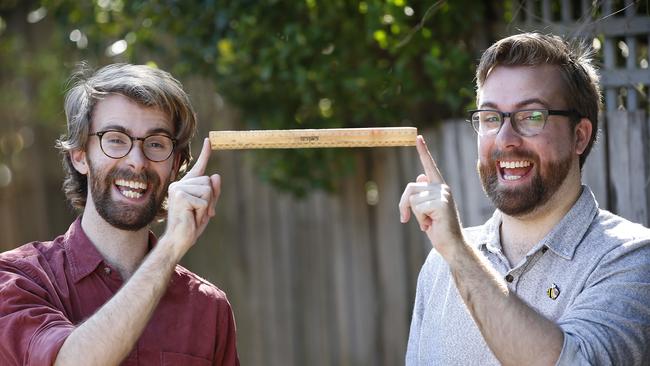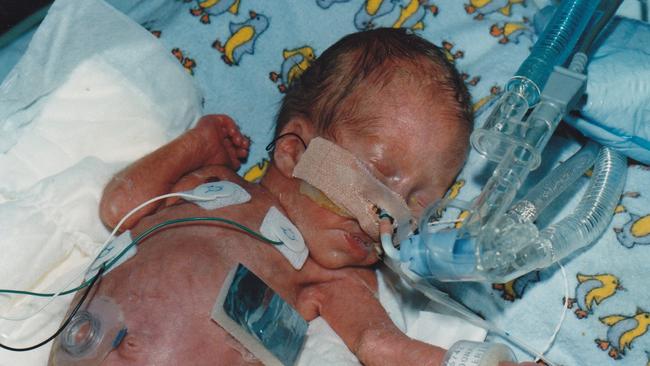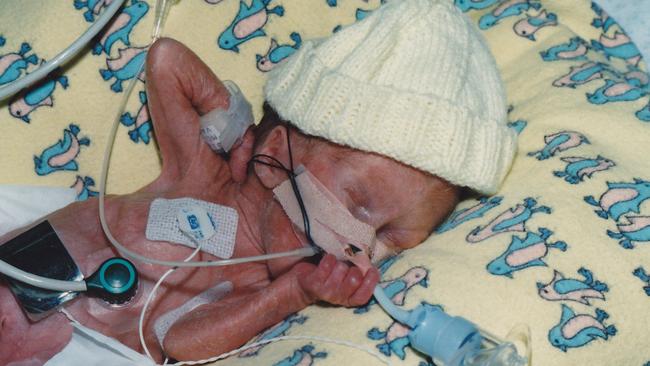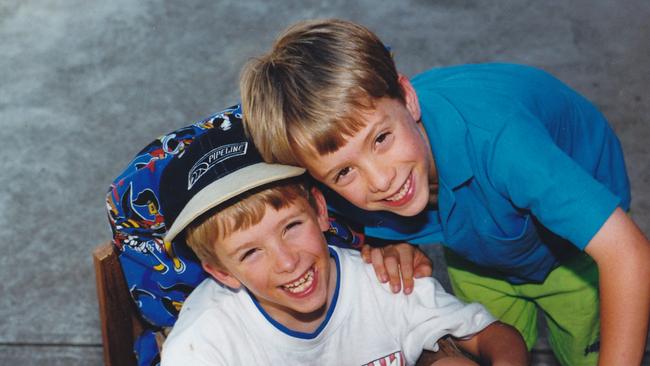Melbourne twins share story of hope after premature baby survival rate soars
Twins Peter and Leigh McDonald were born at 26 weeks gestation and spent 100 days fighting for their lives in hospital as tiny babies. This is how they’ve given other premature babies the chance to live fulfilling lives.

Victoria
Don't miss out on the headlines from Victoria. Followed categories will be added to My News.
Tiny babies born extremely premature have an 85 per cent chance of surviving now, giving hope to families.
Survival rates of preterm babies born in Victoria have increased by almost 20 per cent since the early 1990s, with infants born between 22 and 27 weeks — some as small as 500 grams — now making it home at record rates.
They’re also kept on oxygen for longer while in hospital, and in a more gentle way, which helps their little bodies continue to strengthen and grow.
The positive findings are from a landmark Victorian study — called the Victorian Infant Collaborative Study (VICS) — led by The Royal Women’s Hospital, which has followed more than 1000 babies born premature from the early 90s onwards into adulthood.
It found that babies are now given an overall greater chance at life, thanks to better technology, research and care practices.


Professor Jeanie Cheong, who leads the study and is a neonatologist at the Women’s, said the latest findings from the 2016-2017 cohort show just how far infant care has come.
“These babies are so vulnerable,” Prof Cheong, who is also affiliated with the Murdoch Children’s Research Centre and University of Melbourne, said.
“They’re also very little, their average weight at birth is around 850 grams.
“It’s so critical we understand how things have changed and that these things, this care of extremely preterm babies, translates to meaningful practises and results.”
VICS is the longest running study of its kind in the world, and is a collaboration between Melbourne’s biggest maternal hospitals — the Women’s, Mercy Hospital for Women, Monash Medical Centre and the Royal Children’s Hospital
The study sees teams of specialists check-in and assess those born premature at birth, age two, five and eight, and then again at 18 and 25.

Identical twin brothers Leigh and Peter McDonald were born at the Women’s in 1991 at 26 weeks gestation, weighing 810g and 891g respectively.
Peter spent about 90 days in hospital, while Leigh was discharged after 100 days.
“We were both quite sick,” Leigh, who was the sickest of the two, says.
“Mum always says I was going to be born first and Pete pushed me out of the way. I wasn’t quite ready.
“But Nan used to knit beanies for us – and she used to model them off an orange, that’s how small we were.”
The pair, now 28, have been part of the VICS study their whole life and now feel a “sense of disbelief" looking back at baby photos.
“Mum calls us battlers because we battled for so long, it was touch and go but we got through it,” Peter said.
“I feel very lucky that we’ve had the treatment and help we did but also to just be happy and healthy and live such happy lives.”
The brothers said the study was a chance for them to “give back” and help future generations to lead fulfilling lives like they have.
Prof Cheong said the ongoing research gave hope to families and future premature babies.
“If you’re faced with an extremely preterm baby, there is a good chance we can help and help them to go home,” she said.
MORE NEWS:
MUM’S HEARTBREAKING VIDEO OF SON BEFORE HORROR SMASH
WHY NATURE STRIP PLAYGROUNDS COULD BE THE FUTURE

